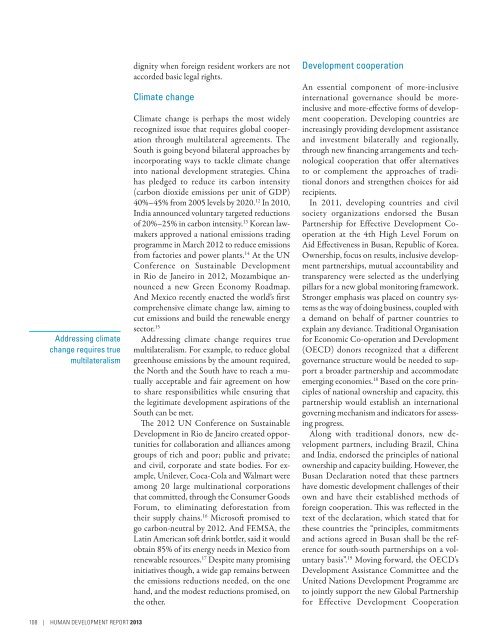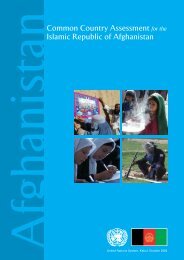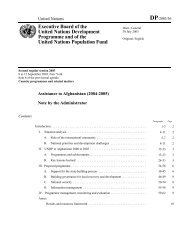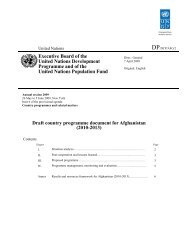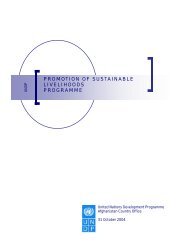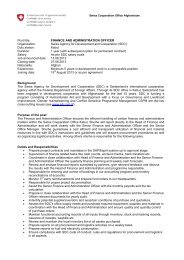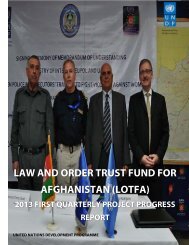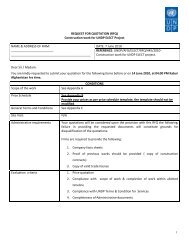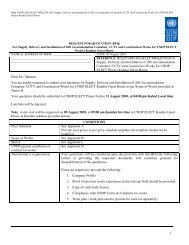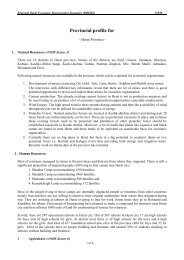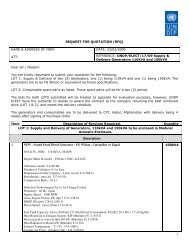E N S W - Human Development Reports - United Nations ...
E N S W - Human Development Reports - United Nations ...
E N S W - Human Development Reports - United Nations ...
You also want an ePaper? Increase the reach of your titles
YUMPU automatically turns print PDFs into web optimized ePapers that Google loves.
Addressing climate<br />
change requires true<br />
multilateralism<br />
dignity when foreign resident workers are not<br />
accorded basic legal rights.<br />
Climate change<br />
Climate change is perhaps the most widely<br />
recognized issue that requires global cooperation<br />
through multilateral agreements. The<br />
South is going beyond bilateral approaches by<br />
incorporating ways to tackle climate change<br />
into national development strategies. China<br />
has pledged to reduce its carbon intensity<br />
(carbon dioxide emissions per unit of GDP)<br />
40%–45% from 2005 levels by 2020. 12 In 2010,<br />
India announced voluntary targeted reductions<br />
of 20%–25% in carbon intensity. 13 Korean lawmakers<br />
approved a national emissions trading<br />
programme in March 2012 to reduce emissions<br />
from factories and power plants. 14 At the UN<br />
Conference on Sustainable <strong>Development</strong><br />
in Rio de Janeiro in 2012, Mozambique announced<br />
a new Green Economy Roadmap.<br />
And Mexico recently enacted the world’s first<br />
comprehensive climate change law, aiming to<br />
cut emissions and build the renewable energy<br />
sector. 15<br />
Addressing climate change requires true<br />
multilateralism. For example, to reduce global<br />
greenhouse emissions by the amount required,<br />
the North and the South have to reach a mutually<br />
acceptable and fair agreement on how<br />
to share responsibilities while ensuring that<br />
the legitimate development aspirations of the<br />
South can be met.<br />
The 2012 UN Conference on Sustainable<br />
<strong>Development</strong> in Rio de Janeiro created opportunities<br />
for collaboration and alliances among<br />
groups of rich and poor; public and private;<br />
and civil, corporate and state bodies. For example,<br />
Unilever, Coca-Cola and Walmart were<br />
among 20 large multinational corporations<br />
that committed, through the Consumer Goods<br />
Forum, to eliminating deforestation from<br />
their supply chains. 16 Microsoft promised to<br />
go carbon-neutral by 2012. And FEMSA, the<br />
Latin American soft drink bottler, said it would<br />
obtain 85% of its energy needs in Mexico from<br />
renewable resources. 17 Despite many promising<br />
initiatives though, a wide gap remains between<br />
the emissions reductions needed, on the one<br />
hand, and the modest reductions promised, on<br />
the other.<br />
<strong>Development</strong> cooperation<br />
An essential component of more-inclusive<br />
international governance should be moreinclusive<br />
and more- effective forms of development<br />
cooperation. Developing countries are<br />
increasingly providing development assistance<br />
and investment bilaterally and regionally,<br />
through new financing arrangements and technological<br />
cooperation that offer alternatives<br />
to or complement the approaches of traditional<br />
donors and strengthen choices for aid<br />
recipients.<br />
In 2011, developing countries and civil<br />
society organizations endorsed the Busan<br />
Partnership for Effective <strong>Development</strong> Cooperation<br />
at the 4th High Level Forum on<br />
Aid Effectiveness in Busan, Republic of Korea.<br />
Ownership, focus on results, inclusive development<br />
partnerships, mutual accountability and<br />
transparency were selected as the underlying<br />
pillars for a new global monitoring framework.<br />
Stronger emphasis was placed on country systems<br />
as the way of doing business, coupled with<br />
a demand on behalf of partner countries to<br />
explain any deviance. Traditional Organisation<br />
for Economic Co-operation and <strong>Development</strong><br />
(OECD) donors recognized that a different<br />
governance structure would be needed to support<br />
a broader partnership and accommodate<br />
emerging economies. 18 Based on the core principles<br />
of national ownership and capacity, this<br />
partnership would establish an international<br />
governing mechanism and indicators for assessing<br />
progress.<br />
Along with traditional donors, new development<br />
partners, including Brazil, China<br />
and India, endorsed the principles of national<br />
ownership and capacity building. However, the<br />
Busan Declaration noted that these partners<br />
have domestic development challenges of their<br />
own and have their established methods of<br />
foreign cooperation. This was reflected in the<br />
text of the declaration, which stated that for<br />
these countries the “principles, commitments<br />
and actions agreed in Busan shall be the reference<br />
for south-south partnerships on a voluntary<br />
basis”. 19 Moving forward, the OECD’s<br />
<strong>Development</strong> Assistance Committee and the<br />
<strong>United</strong> <strong>Nations</strong> <strong>Development</strong> Programme are<br />
to jointly support the new Global Partnership<br />
for Effective <strong>Development</strong> Cooperation<br />
108 | HUMAN DEVELOPMENT REPORT 2013


